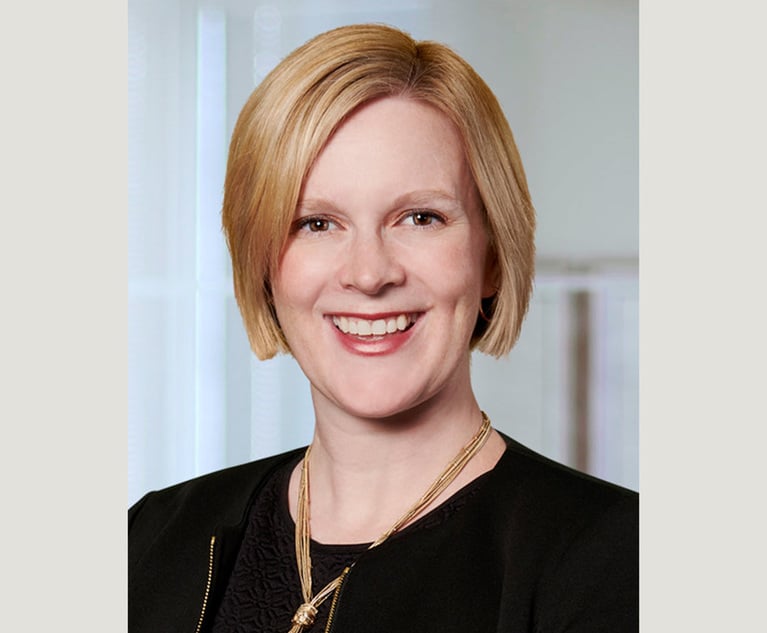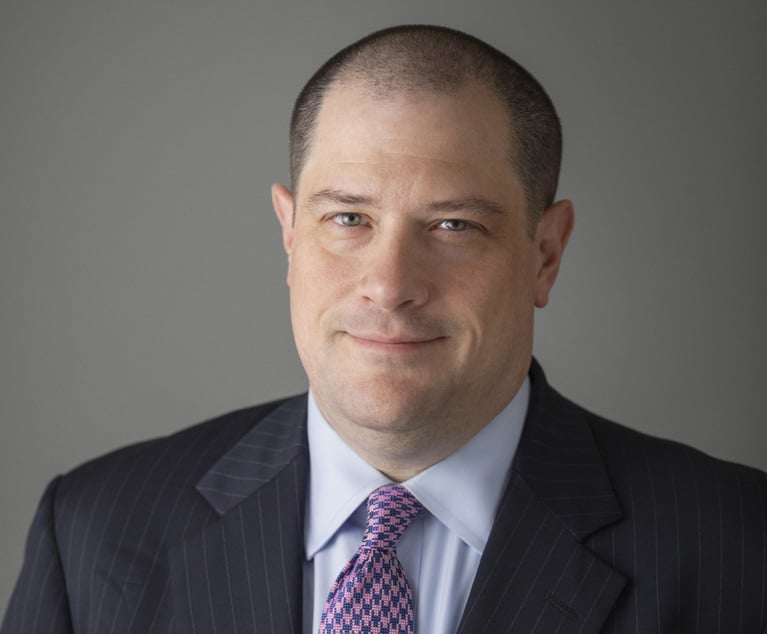Meet the Former Supreme Court Clerks Suing Jones Day
It's easy to say Mark Savignac and Julia Sheketoff were a mismatch with the firm now, but I can't help asking this question: How did Jones Day's Supreme Court and appellate practice group win them over, when they could have gone to any firm that their heart desired?
August 21, 2019 at 04:08 PM
5 minute read
The original version of this story was published on The American Lawyer
 Photo by Diego M. Radzinschi
Photo by Diego M. Radzinschi
Of all the fair law firms in the land, how did Mark Savignac and Julia Sheketoff pick Jones Day to launch their careers? That question must be bugging the hell out of them at the moment.
Not long ago, they were trophy recruits for the firm (Savignac and Sheketoff are both former clerks of U.S. Supreme Court Justice Stephen Breyer), trotted out like prized stallions. But now, they are embroiled in a bitter lawsuit against their former firm in which they claim that Jones Day's parental leave policy discriminates based on gender and that Savignac was fired in retaliation for complaining about the policy.
 It's easy to say they were a mismatch with the firm now, but I can't help asking this question: How did Jones Day's Supreme Court and appellate practice group win them over, when they could have gone to any firm that their heart desired?
It's easy to say they were a mismatch with the firm now, but I can't help asking this question: How did Jones Day's Supreme Court and appellate practice group win them over, when they could have gone to any firm that their heart desired?
Was it the money? Inevitably, that had to be a big draw. Jones Day, as everyone knows, pays big bucks for Supreme Court clerks. According to their complaint, Savignac started at the firm in May 2017 with a $375,000 salary plus a $350,000 Supreme Court clerk bonus; then in July, his salary rose to $405,000. That's a grand total of $755,000!
But monetary rewards were probably not the only seduction. (Firms such as Susman Godfrey reportedly pay more than Jones Day for Supreme Court clerks.)
From their complaint, what comes through is a sense of personal disappointment and betrayal—something akin to a promising relationship gone toxic.
So why are these two young lawyers (Sheketoff, 36, is now working at the Federal Public Defender's Office and Savignac, 32, is an associate at Steptoe & Johnson) with their futures in front of them taking on a big, powerful law firm like Jones Day? And how do they think this will affect their career trajectory?
I posed these questions and more to them during several phone calls. Below is an edited version of our conversation. (Jones Day responded to inquiries by referring to its previously issued statement.)
Jones Day issued a statement in response to your complaint in which you were both assailed. Mark, the firm calls your views of its leave policy "false and self-indulgent," then it suggested that you acted like an ingrate for making demands "that no reasonable person would view as anything but exceptionally generous." What's your reaction? We strongly believe our view of the policy is correct.
Julia, your complaint says that you got good reviews except for the partner you had a run-in with—the one that you said expected deferential behavior from women. But the firm claims that you got mixed reviews from a bunch of partners. I got a raise for $85,000 the last year I was at the firm and my final salary was $525,000. If [managing partner Stephen] Brogan thought so little of me, I wonder what he thought about all the women that he paid even less. [The firm pays a wide range of salaries, as evidenced by the documents in the pending class action suit for gender discrimination.]
I can't imagine what it must be like to sue a big firm. How did you decide to start the lawsuit? Julia: Mark's firing was devastating to us. Mark: It was illegal act, and I don't see how you can not sue them when that happens.
Mark, you didn't expect to be fired for complaining, did you? Mark: We were completely shocked and never thought they would do something that's retaliatory and illegal. We felt exposed and stunned.
Parts of your complaint read like a novel. The lawsuit also seems very personal in that Beth Heifetz [who heads the firm's appellate and Supreme Court group] recruited you, gave you advice, then, according to your telling, turned against you by making it virtually impossible for Mark to get a reference. Julia: I don't want to say it's personal or not. After I finished my clerkship, a huge reason I went to Jones Day was because of Beth. She seemed like a progressive person and I thought she would look after me.
Why are you doing this pro se? Mark: We care about these issues and we're both lawyers.
Are there any discussions to settle? Mark: We can't comment on that.
Do you regret going to Jones Day? Julia: We regret that we were treated illegally.
It seems Jones Day was perhaps not a good fit. Julia: It's fair to say that it's run by Steve Brogan and that [structure] affects a lot of decisions. I think that's what distinguishes it from other firms. It's more of an autocratic structure rather than a democratic one.
Do you think Supreme Court clerks are paying attention to this case and that this will affect their choice of jobs? Mark: It certainly would have affected me.
Contact Vivia Chen at [email protected]. On Twitter: @lawcareerist.
This content has been archived. It is available through our partners, LexisNexis® and Bloomberg Law.
To view this content, please continue to their sites.
Not a Lexis Subscriber?
Subscribe Now
Not a Bloomberg Law Subscriber?
Subscribe Now
NOT FOR REPRINT
© 2024 ALM Global, LLC, All Rights Reserved. Request academic re-use from www.copyright.com. All other uses, submit a request to [email protected]. For more information visit Asset & Logo Licensing.
You Might Like
View All
Less Is More: The Risks of Excessive Data Collection from Mobile Devices
6 minute read
How My Postpartum Depression Led to Launching My Firm’s Parental Leave Coaching Program
9 minute read
Protecting Attorney-Client Privilege in the Modern Age of Communications
6 minute readTrending Stories
- 1Judicial Ethics Opinion 24-68
- 2Friday Newspaper
- 3Judge Denies Sean Combs Third Bail Bid, Citing Community Safety
- 4Republican FTC Commissioner: 'The Time for Rulemaking by the Biden-Harris FTC Is Over'
- 5NY Appellate Panel Cites Student's Disciplinary History While Sending Negligence Claim Against School District to Trial
Who Got The Work
Michael G. Bongiorno, Andrew Scott Dulberg and Elizabeth E. Driscoll from Wilmer Cutler Pickering Hale and Dorr have stepped in to represent Symbotic Inc., an A.I.-enabled technology platform that focuses on increasing supply chain efficiency, and other defendants in a pending shareholder derivative lawsuit. The case, filed Oct. 2 in Massachusetts District Court by the Brown Law Firm on behalf of Stephen Austen, accuses certain officers and directors of misleading investors in regard to Symbotic's potential for margin growth by failing to disclose that the company was not equipped to timely deploy its systems or manage expenses through project delays. The case, assigned to U.S. District Judge Nathaniel M. Gorton, is 1:24-cv-12522, Austen v. Cohen et al.
Who Got The Work
Edmund Polubinski and Marie Killmond of Davis Polk & Wardwell have entered appearances for data platform software development company MongoDB and other defendants in a pending shareholder derivative lawsuit. The action, filed Oct. 7 in New York Southern District Court by the Brown Law Firm, accuses the company's directors and/or officers of falsely expressing confidence in the company’s restructuring of its sales incentive plan and downplaying the severity of decreases in its upfront commitments. The case is 1:24-cv-07594, Roy v. Ittycheria et al.
Who Got The Work
Amy O. Bruchs and Kurt F. Ellison of Michael Best & Friedrich have entered appearances for Epic Systems Corp. in a pending employment discrimination lawsuit. The suit was filed Sept. 7 in Wisconsin Western District Court by Levine Eisberner LLC and Siri & Glimstad on behalf of a project manager who claims that he was wrongfully terminated after applying for a religious exemption to the defendant's COVID-19 vaccine mandate. The case, assigned to U.S. Magistrate Judge Anita Marie Boor, is 3:24-cv-00630, Secker, Nathan v. Epic Systems Corporation.
Who Got The Work
David X. Sullivan, Thomas J. Finn and Gregory A. Hall from McCarter & English have entered appearances for Sunrun Installation Services in a pending civil rights lawsuit. The complaint was filed Sept. 4 in Connecticut District Court by attorney Robert M. Berke on behalf of former employee George Edward Steins, who was arrested and charged with employing an unregistered home improvement salesperson. The complaint alleges that had Sunrun informed the Connecticut Department of Consumer Protection that the plaintiff's employment had ended in 2017 and that he no longer held Sunrun's home improvement contractor license, he would not have been hit with charges, which were dismissed in May 2024. The case, assigned to U.S. District Judge Jeffrey A. Meyer, is 3:24-cv-01423, Steins v. Sunrun, Inc. et al.
Who Got The Work
Greenberg Traurig shareholder Joshua L. Raskin has entered an appearance for boohoo.com UK Ltd. in a pending patent infringement lawsuit. The suit, filed Sept. 3 in Texas Eastern District Court by Rozier Hardt McDonough on behalf of Alto Dynamics, asserts five patents related to an online shopping platform. The case, assigned to U.S. District Judge Rodney Gilstrap, is 2:24-cv-00719, Alto Dynamics, LLC v. boohoo.com UK Limited.
Featured Firms
Law Offices of Gary Martin Hays & Associates, P.C.
(470) 294-1674
Law Offices of Mark E. Salomone
(857) 444-6468
Smith & Hassler
(713) 739-1250









